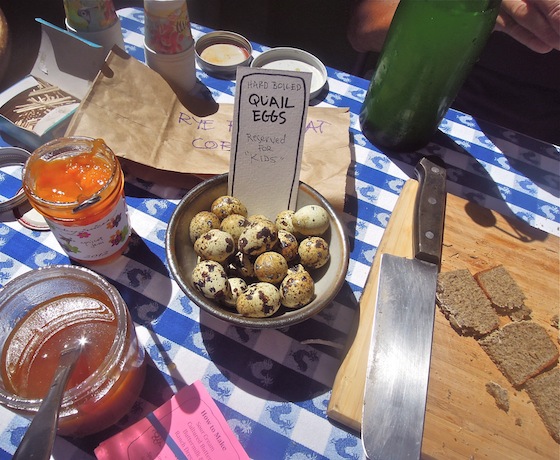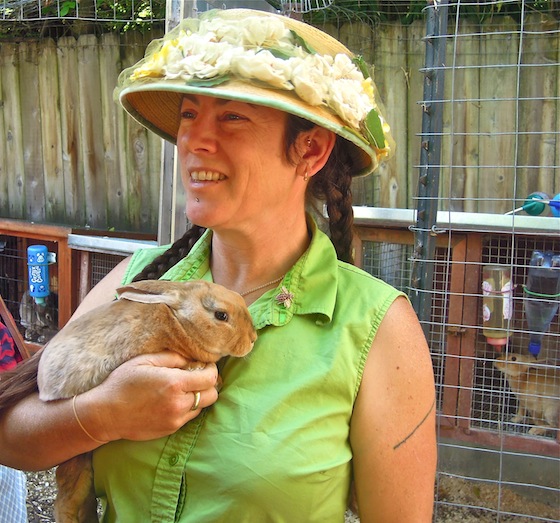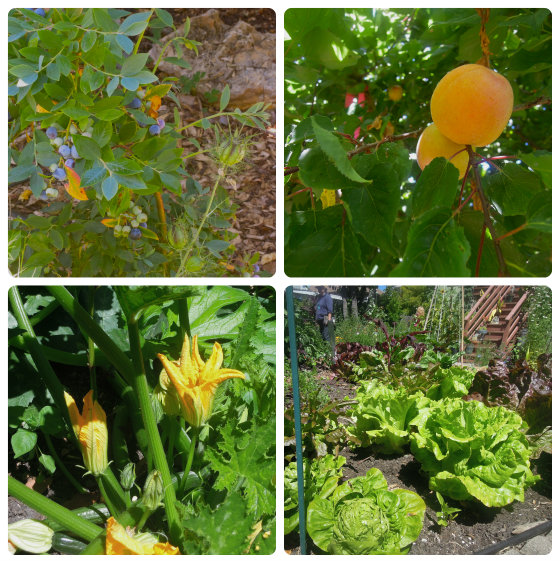
Beegrrl Gardens
Blume’s own backyard farm, Beegrrl Gardens, features more than 200 species of plants (including 18 fruit trees, 7 kinds of berries and stunningly healthy looking vegetables) a covey of quail, a colony of rabbits, 2 beehive systems, a bathtub bog and a vine of climbing hops that you can practically see inching its way to the roof.
Her tour begins with generous samples of homemade ginger beer, strawberry soda, apricot jam, strawberry honey, butter, feta and rye buckwheat bread. Walking through Blume's prodigious produce, the dozen or so eager tour-goers pose questions about grey water systems, fending off raccoons, and how she deals with aging rabbits. Blume answers, “I want them to have a happy life and then dispatch them in the most humane way possible."
A Berkeley native, who describes herself as “the normal kid of hippie parents,” Blume has always loved plants. When someone left her some bees for safekeeping, but never returned for them, she was “bitten.” After keeping bees for 15 years, she ventured into cheese making and currently teaches an amazing array of homesteading arts, including organic gardening, bee keeping, rabbit butchery and tanning, cheese making, canning, mead brewing, fermentation, as well as hand sewing, mosaics and ceramics at the Institute. She is also co-author of the book Urban Homesteading.
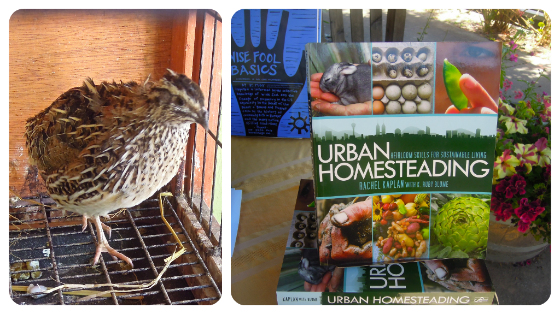
While she provides her quail a pan of diatomaceous earth and watches them revel in a little earth bath, Blume says, “My goal with these farm tours is to inspire visitors by giving them a sense of what’s possible in the city and show how doable it is.”
Tiny Berkeley Garden
Kristin Stromberg discovered that tending her, aptly named, Tiny Berkeley Garden is as much about growing community as it is about raising food crops on the petite front and back plots of her Berkeley home. During her tour, she hands out large purplish green leaves from her perennial tree collard to anyone who asks, so they can root their own plant at home. Passersby are encouraged to sample the pineapple-flavored, bright orange fruit hiding in the papery husks of her groundcherry, (aka cape gooseberry). Stromberg points to the gorgeous artichokes that one enthusiastic neighbor admired so much that Stromberg gave her a perfect green globe to take home. “Before I had my garden, I just knew a few of my neighbors, but now I know everyone! When my pumpkins came up last year I had all the neighborhood kids asking when they would be ready.”

Kristen Stromberg
Planting Justice, an Oakland non-profit, helped Stromberg clean out her overgrown yard, lay sheet mulch and plant the crops she requested. The front yard features herbs and flowers to attract butterflies and bees, with peppers, pumpkins, tomato plants, fuji apple and comice pear trees plus sage lemon verbena, basil and yarrow. In the back, she has asparagus, corn, kale, radish, carrots, zucchini, berries plus fig, plum, pluot and apricot trees. Her wooden coop houses 3 rabbits and 5 chickens. Besides providing eggs, the chickens scratch up the rabbit poop with the soil so she can use it on her planting beds.
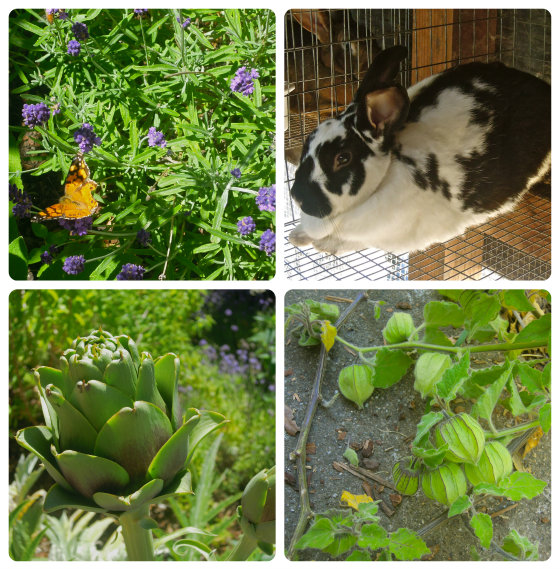
Stromberg describes how the 3 rabbits she had originally picked out somehow turned into 16 by the time she came back to pick them up after a planned trip and now she happens to have frozen rabbit meat in her freezer. One tour-goer offered to buy some rabbit meat to make a French stew, but Stromberg suggested trading her meat for his recipe. A software developer who works from home, Stromberg takes breaks from the computer to feed her animals, water the plants or just sit on the white metal bench in her back yard to watch her brood cavort, or as she calls it “chicken TV.”

Nicolas Sheon and Gazpacho
Indigoat Farms
Two week-old baby goats, named Gazpacho and Violet, enchant both child and adult visitors to Indigoat Farms. The feisty brother and sister are willing to be cuddled and petted for just a moment, but soon wriggle away to practice their head-butting skills. For Nicolas and Susannah Sheon, who already kept a brood of chickens in their Oakland backyard, the leap to goats was inspired by the need for a dairy queen with a name. “Four years ago, our oldest daughter was 14 and vegan,” Nicolas tells the rapt crowd. “ We were worried because she didn’t seem to be getting enough nourishment. She called herself a ‘politarian,’ meaning that she was opposed to the treatment of factory-raised animals. But then we discovered a farmer selling goat cheese at the Grand Lake Farmers Market, who posted pictures of his goats along with their names. Our daughter said, ‘I’ll eat dairy if it comes from a goat I know.’”
With advice and mentoring from Jim Montgomery of Green Faerie Farm, the Sheons chose to raise sweet-natured Oberhasli goats, who are relatively quiet (in deference to their neighbors). These Swiss alpine goats love to run up and down ramps the Sheons built for them to connect to a tree house. Neighborhood children adore the goats and often come by to visit or greet them when Nicolas takes them for walks (on leashes) through the local streets.
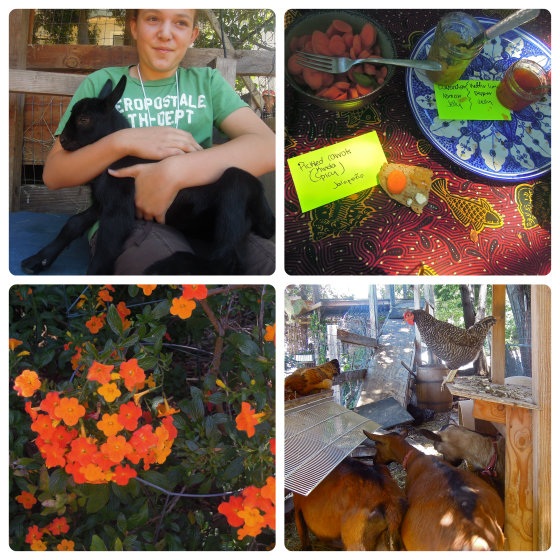
The family’s chickens and goats get along well. Chickens turn up the soil where the goats pee so it doesn’t smell. And the goats scare away any hungry raccoons. Goat pellets have no odor, so the Sheons can use them directly on their vegetable garden.
